Ed Gorman's Blog, page 172
January 30, 2012
Will the e book bubble burst?
Ed here: That very good writer Harry Shannon found this article in the Guardian UK and linked to it. You've heard of the housing bubble? Will there be an e book bubble? This is long but well worth reading.
The self-epublishing bubble
In August 2011, Ewan Morrison published an article entitled Are Books Dead and Can Authors Survive?. Here, he tracks the self-
Ewan Morrison
guardian.co.uk, Monday 30 January 2012 06.08 EST
Unlikely to last very long ... a bubble rises. Photograph: Dylan Martinez/Reuters
The internet is full of ironies. I, for one, could never have guessed that writing about the end of books would generate more income for me than actually publishing the damn things. I've been on an End of Books reading tour since August and it turns out that what the internet gurus say about consumers being more willing to pay for events, speeches and gigs, rather than buying cultural objects, is now becoming true.
At the other end of the political spectrum from me, among the epublishing enthusiasts and digital fundamentalists, similar ironies are playing out: there is now a boom industry in "How to get rich writing ebooks" manuals, as well as a multitude of blogs offering tips and services, and a new breed of specialists who'll charge you anything from $37 to $149 to get your ebook into shape.
This all seems like a repeat of the boom in get-rich-quick manuals and "specialists" that appeared around blogs and etrading. Did anyone actually get rich from writing blogs, you may ask? Well, according to Jaron Lanier (author of You are not a Gadget) there are only a handful of people in the world who can prove that they make a living from blogging: it's entirely possible that more money was made by those who wrote and sold the how-to manuals than by the bloggers themselves. But who cares, right? It's all part of the euphoria of digital change, and technological innovation is as unstoppable a force as fate. Reports show that paper book sales are "tanking" – down a massive 54.3% while ebook sales are up triumphantly by 138%. The revolution will be epublished, and we're all going to be part of it.
All of this ebook talk is becoming a business in itself. Money is being made out of thin air in this strange new speculative meta-practice: there are seminars, conferences and courses springing up everywhere, even at the Society of Authors (a writers' union which, until recently, was largely against epublication). Television and radio programmes are being made about self-epublishing (I've personally been asked to speak about it on 12 occasions since August). Everyone can be a writer now: it only takes 10 minutes to upload your own ebook, and according to the New York Times "81% of people feel they have a book in them ... And should write it"
http://www.guardian.co.uk/books/2012/...
The self-epublishing bubble
In August 2011, Ewan Morrison published an article entitled Are Books Dead and Can Authors Survive?. Here, he tracks the self-
Ewan Morrison
guardian.co.uk, Monday 30 January 2012 06.08 EST
Unlikely to last very long ... a bubble rises. Photograph: Dylan Martinez/Reuters
The internet is full of ironies. I, for one, could never have guessed that writing about the end of books would generate more income for me than actually publishing the damn things. I've been on an End of Books reading tour since August and it turns out that what the internet gurus say about consumers being more willing to pay for events, speeches and gigs, rather than buying cultural objects, is now becoming true.
At the other end of the political spectrum from me, among the epublishing enthusiasts and digital fundamentalists, similar ironies are playing out: there is now a boom industry in "How to get rich writing ebooks" manuals, as well as a multitude of blogs offering tips and services, and a new breed of specialists who'll charge you anything from $37 to $149 to get your ebook into shape.
This all seems like a repeat of the boom in get-rich-quick manuals and "specialists" that appeared around blogs and etrading. Did anyone actually get rich from writing blogs, you may ask? Well, according to Jaron Lanier (author of You are not a Gadget) there are only a handful of people in the world who can prove that they make a living from blogging: it's entirely possible that more money was made by those who wrote and sold the how-to manuals than by the bloggers themselves. But who cares, right? It's all part of the euphoria of digital change, and technological innovation is as unstoppable a force as fate. Reports show that paper book sales are "tanking" – down a massive 54.3% while ebook sales are up triumphantly by 138%. The revolution will be epublished, and we're all going to be part of it.
All of this ebook talk is becoming a business in itself. Money is being made out of thin air in this strange new speculative meta-practice: there are seminars, conferences and courses springing up everywhere, even at the Society of Authors (a writers' union which, until recently, was largely against epublication). Television and radio programmes are being made about self-epublishing (I've personally been asked to speak about it on 12 occasions since August). Everyone can be a writer now: it only takes 10 minutes to upload your own ebook, and according to the New York Times "81% of people feel they have a book in them ... And should write it"
http://www.guardian.co.uk/books/2012/...
Published on January 30, 2012 14:20
January 29, 2012
Sam McCain E BOOKS!!!
http://www.amazon.com/Original-Sam-Mc...
From The Seattle-Post Intelligencer
Perhaps no other author today has done so much to keep alive the "Pulp Fiction" genre than Ed Gorman. Not only as an award winning author ( Spur Award for Best Short Fiction, "The Face" in 1992. His fiction collection Cages was nominated for the 1995 Bram Stoker Award for Best Fiction Collection. His collection The Dark Fantastic was nominated for the same award in 2001. He has also been an archivist, historian and commentator. He has written in the fields of terror/horror, speculative fiction, western and of course hardboiled/crime fiction.
His Sam McCain novels are perhaps my favorites…but I have not only a soft spot for crime fiction but also a nostalgic bent for the '50s. McCain embodies all the traits we love of the hardboiled detective; he's smart, quick with a quip, educated, but struggling for a buck, honest and honorable (at least to his own personal code), he's personally brave, almost chivalrous, and like a bull dog at unraveling a mystery.
But, he is also dichotomous in that he is a little guy at just over five and a half feet,and, thus, not one to quickly get in a fight. He was never a cop or a soldier, doesn't "really" hate authority, has dinner at least once a week with mom and dad, loves rock and roll, not jazz, isn't a big drinker. Instead of that '30s – '40s fedora wearing, zoot suited PI, driving a Model 'A' or some other piece of Detroit iron with running boards, McCain loves '50s hotrods. McCain is a recent law school grad who gets his PI license to make ends meet and broaden his prospects.
Also, to break the mold of most pulp/hardboiled crime fiction, his mysteries don't take place in a large city (L.A., Chicago, N.Y. or their fictionally renamed likenesses). Instead, the stories take place, mainly, in a small Iowa town where McCain grew up. And to further break the mold, the crimes McCain ends up investigating aren't stolen pearls or bank robberies, or the theft of historical artifacts. They are crimes to take the sheen off of the nostalgia shown in the popular media for the '50s. This isn't Happy Days. This isn't American Graffiti. This is not the '50s of Ozzie & Harriet and Father Knows Best.
Instead, Gorman takes for his themes the real crimes of the fifties. Gorman writes about the social ills of the decade, some of which are still with us today. Racial inequality and bigotry, male chauvinism and the lack of women's rights, union busting, red baiting and McCarthyism and the large parts of the country that were still in the grips of poverty.
Yes, boys and girls, our country had bigger problems than Elvis getting drafted, the Edsel, and getting a date for the sock hop on Saturday night.
Here's Gorman's words: "Part of the reason I started writing the Sam McCain novels was because I was sick of hearing about how wonderful the decade of the Fifties was. …. By then even the Republicans knew better. If you were white, Christian, middle-class, straight and white collar the decade was probably more decent to you than not. But given the racism, sexism, Communist witch hunts, union-busting and large pockets of poverty, not even Ozzie's dopey smile could make the excluded Happy."
Now don't get the idea these stories are sermons. They aren't. They just deal with 'the real picture' of the decade that is often painted as the American Ideal. The books, while remaining great mysteries and giving a long over do update to the genre, are humorous and Sam's dialogue is as sharp an cynical as Phillip Marlowe's. The mysteries are as puzzling as anything in the genre, the characters are very real and very true to their time and place, and he manages to expose social ills as well as Dashiell Hammett. In short, Ed Gorman is one of the gems in these fictional fields.
In this edition, Genius Book Publishing has made available the first two Sam McCain Novels in one Special Kindle Edition.
The first novel is titled, The Day The Music Died, and is set against the backdrop of the tragic plane crash in Iowa that took the lives of Buddy Holly, Richie Valens and The Big Bopper. The story opens with McCain and his high school sweat heart,Pamela Forrest, leaving The Surf Ballroom, having just witnessed Holly's last show. They get in McCain's '51 Ford convertible with the custom skirts, louvered hood and special weave top. With that description, Gorman take's the genre out of the jazz age and into the world of rock and roll.
On the trip home to Black River Falls through the same snow storm that would kill the legends, McCain and Pamela argue over the radio station, she wants to listen to Perry Como, and McCain loves Buddy Holly. Pamela is also in love with someone else, but McCain will carry his flame for her through the snow storm and through the series, just like he has since the 4th grade.
The next morning about 5 a.m McCain gets woken up by his employer, Judge Esme Anne Whitney, a wealth scion of the small town. Her nephew is hold up on his estate, drunk and threatening suicide. McCain is to keep it quiet since the local Chief of Police is the new money in the town and the enemy socially and politically of the judge. When McCain arrives and makes his way inside, he discovers that Kenny's wife is dead, shot, and Kenny admits to shooting her, then promptly kills himself.
Before putting the gun to his head, Kenny admits to the murder. He tells McCain that Susan was running around on him and wanted a divorce, he got drunk and must have shot her. But after Kenny kills himself, the story and the evidence don't add up for McCain even though the local chief, the "hillbilly' Sykes, wants to gloat over a Whitney being a wife murderer and a suicide.
McCain starts to investigate and along the way to solving the mystery he uncovers the prevalent racist attitudes of the town, tries to discover an unsafe abortionist who just may be involved, a cultish artistic couple and their "open marriage" all the while pursuing Pamela while being pursued by a girl who has loved him just as long as he has loved Pamela.
The plot is beautiful, and introduces the reader to McCain, an honest voice of the '50s and one of the smartest and most likable PIs you'll ever meet. Gorman's writing style will trap you, even if you don't want to be trapped. The Day The Music Died is both dark poetry and a great, engrossing read.
The second book included in this bundle is Wake Up Little Susie, and is really a prequel, taking place 2 years earlier, in 1957 on the day that Ford Introduced its new "revolutionary" Edsel automobile. When the district attorneys wife is found in the trunk of a new Edsel in the local car lot, McCain follows the clues to uncover the real killer while the local police try to discourage him, and aim to 'hang' the obvious suspect which will feed their political needs as well as their cruelty and small mindedness.
If you are familiar with Gorman then you'll want to get these two books in eBook form, and if you haven't read him before, then this is the perfect opportunity to dive into one of the best crime writers working today.
The Original Sam McCain Mysteries
Ed Gorman
Buy New
From The Seattle-Post Intelligencer
Perhaps no other author today has done so much to keep alive the "Pulp Fiction" genre than Ed Gorman. Not only as an award winning author ( Spur Award for Best Short Fiction, "The Face" in 1992. His fiction collection Cages was nominated for the 1995 Bram Stoker Award for Best Fiction Collection. His collection The Dark Fantastic was nominated for the same award in 2001. He has also been an archivist, historian and commentator. He has written in the fields of terror/horror, speculative fiction, western and of course hardboiled/crime fiction.
His Sam McCain novels are perhaps my favorites…but I have not only a soft spot for crime fiction but also a nostalgic bent for the '50s. McCain embodies all the traits we love of the hardboiled detective; he's smart, quick with a quip, educated, but struggling for a buck, honest and honorable (at least to his own personal code), he's personally brave, almost chivalrous, and like a bull dog at unraveling a mystery.
But, he is also dichotomous in that he is a little guy at just over five and a half feet,and, thus, not one to quickly get in a fight. He was never a cop or a soldier, doesn't "really" hate authority, has dinner at least once a week with mom and dad, loves rock and roll, not jazz, isn't a big drinker. Instead of that '30s – '40s fedora wearing, zoot suited PI, driving a Model 'A' or some other piece of Detroit iron with running boards, McCain loves '50s hotrods. McCain is a recent law school grad who gets his PI license to make ends meet and broaden his prospects.
Also, to break the mold of most pulp/hardboiled crime fiction, his mysteries don't take place in a large city (L.A., Chicago, N.Y. or their fictionally renamed likenesses). Instead, the stories take place, mainly, in a small Iowa town where McCain grew up. And to further break the mold, the crimes McCain ends up investigating aren't stolen pearls or bank robberies, or the theft of historical artifacts. They are crimes to take the sheen off of the nostalgia shown in the popular media for the '50s. This isn't Happy Days. This isn't American Graffiti. This is not the '50s of Ozzie & Harriet and Father Knows Best.
Instead, Gorman takes for his themes the real crimes of the fifties. Gorman writes about the social ills of the decade, some of which are still with us today. Racial inequality and bigotry, male chauvinism and the lack of women's rights, union busting, red baiting and McCarthyism and the large parts of the country that were still in the grips of poverty.
Yes, boys and girls, our country had bigger problems than Elvis getting drafted, the Edsel, and getting a date for the sock hop on Saturday night.
Here's Gorman's words: "Part of the reason I started writing the Sam McCain novels was because I was sick of hearing about how wonderful the decade of the Fifties was. …. By then even the Republicans knew better. If you were white, Christian, middle-class, straight and white collar the decade was probably more decent to you than not. But given the racism, sexism, Communist witch hunts, union-busting and large pockets of poverty, not even Ozzie's dopey smile could make the excluded Happy."
Now don't get the idea these stories are sermons. They aren't. They just deal with 'the real picture' of the decade that is often painted as the American Ideal. The books, while remaining great mysteries and giving a long over do update to the genre, are humorous and Sam's dialogue is as sharp an cynical as Phillip Marlowe's. The mysteries are as puzzling as anything in the genre, the characters are very real and very true to their time and place, and he manages to expose social ills as well as Dashiell Hammett. In short, Ed Gorman is one of the gems in these fictional fields.
In this edition, Genius Book Publishing has made available the first two Sam McCain Novels in one Special Kindle Edition.
The first novel is titled, The Day The Music Died, and is set against the backdrop of the tragic plane crash in Iowa that took the lives of Buddy Holly, Richie Valens and The Big Bopper. The story opens with McCain and his high school sweat heart,Pamela Forrest, leaving The Surf Ballroom, having just witnessed Holly's last show. They get in McCain's '51 Ford convertible with the custom skirts, louvered hood and special weave top. With that description, Gorman take's the genre out of the jazz age and into the world of rock and roll.
On the trip home to Black River Falls through the same snow storm that would kill the legends, McCain and Pamela argue over the radio station, she wants to listen to Perry Como, and McCain loves Buddy Holly. Pamela is also in love with someone else, but McCain will carry his flame for her through the snow storm and through the series, just like he has since the 4th grade.
The next morning about 5 a.m McCain gets woken up by his employer, Judge Esme Anne Whitney, a wealth scion of the small town. Her nephew is hold up on his estate, drunk and threatening suicide. McCain is to keep it quiet since the local Chief of Police is the new money in the town and the enemy socially and politically of the judge. When McCain arrives and makes his way inside, he discovers that Kenny's wife is dead, shot, and Kenny admits to shooting her, then promptly kills himself.
Before putting the gun to his head, Kenny admits to the murder. He tells McCain that Susan was running around on him and wanted a divorce, he got drunk and must have shot her. But after Kenny kills himself, the story and the evidence don't add up for McCain even though the local chief, the "hillbilly' Sykes, wants to gloat over a Whitney being a wife murderer and a suicide.
McCain starts to investigate and along the way to solving the mystery he uncovers the prevalent racist attitudes of the town, tries to discover an unsafe abortionist who just may be involved, a cultish artistic couple and their "open marriage" all the while pursuing Pamela while being pursued by a girl who has loved him just as long as he has loved Pamela.
The plot is beautiful, and introduces the reader to McCain, an honest voice of the '50s and one of the smartest and most likable PIs you'll ever meet. Gorman's writing style will trap you, even if you don't want to be trapped. The Day The Music Died is both dark poetry and a great, engrossing read.
The second book included in this bundle is Wake Up Little Susie, and is really a prequel, taking place 2 years earlier, in 1957 on the day that Ford Introduced its new "revolutionary" Edsel automobile. When the district attorneys wife is found in the trunk of a new Edsel in the local car lot, McCain follows the clues to uncover the real killer while the local police try to discourage him, and aim to 'hang' the obvious suspect which will feed their political needs as well as their cruelty and small mindedness.
If you are familiar with Gorman then you'll want to get these two books in eBook form, and if you haven't read him before, then this is the perfect opportunity to dive into one of the best crime writers working today.
The Original Sam McCain Mysteries
Ed Gorman
Buy New
Published on January 29, 2012 08:55
January 28, 2012
CINEMA RETRO ISSUE #22 NOW SHIPPING WORLDWIDE! ...
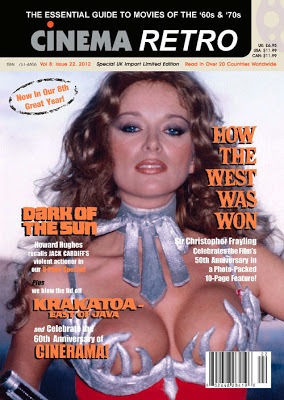
Ed here:n ANOTHER AMAZING ISSUE PACKED FULL WITH SEVERAL MAJOR ARTICLES AND INTERVIEWS!
CINEMA RETRO ISSUE #22 NOW SHIPPING WORLDWIDE! ...
Celebrating Films of the 1960s & 1970s
CINEMA RETRO ISSUE #22 NOW SHIPPING WORLDWIDE! CINERAMA CELEBRATION ISSUE!
Cinema Retro enters its eighth great year with issue #22, now shipping worldwide. All subscribers will be receiving their copies shortly.
If you have not renewed your subscription, please do so today! We cannot hold copies in reserve for you, so don't miss out on a single great issue during 2012. Click here to subscribe instantly through our Ebay affiliate store or click here for other methods of subscribing.
Highlights of issue #22 include special features that celebrate the 60th anniversary of Cinerama:
Sir Christopher Frayling provides a major 10 page article on the making of MGM's Cinerama blockbuster How the West Was Won, featuring deleted scenes and a wealth of rarely seen photographs.
Howard Hughes pays tribute to Jack Cardiff's 1968 gut-busting adventure Dark of the Sun (aka The Mercenaries) starring Rod Taylor
Dave Worrall blows the lid off the 1969 Cinerama epic Krakatoa, East of Java and takes us behind the scenes for the Cinerama family classic The Wonderful World of the Brothers Grimm.
Thomas Hauerslev takes us back to those wonderful Cinerama travelogues This is Cinerama, Seven Wonders of the World and traces the history of the format.
Lee Pfeiffer reviews a plethora of spy movies on DVD including The Man From U.N.C.L.E. feature films
Adrian Smith interviews actress Anneke Wills, star of the mod London cult classic The Pleasure Girls and pays tribute to Jane Asher in Jerzy Skolimowsky's Deep End
Raymond Benson looks at the best films of 1981
Gareth Owen revisits the filming of The Great Gatsby at Pinewood Studios
Plus the latest DVD, soundtrack and film book reviews
Published on January 28, 2012 19:22
David Milch's "Luck" hits the HBO trifecta
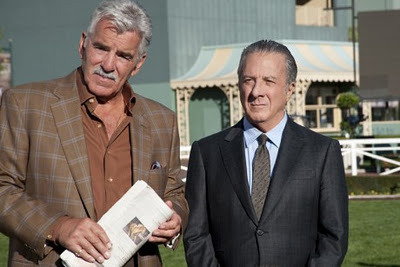
Ed here: I'm really looking forward to this.
David Milch's "Luck" hits the HBO trifecta
Dustin Hoffman stars in the next great series from the creator of "Deadwood" and "John From Cincinnati"
BY ROGER CATLIN
Dennis Farina and Dustin Hoffman in "Luck" (Credit: HBO)
TOPICS:TELEVISION, HBO, DAVID MILCH, EDITOR'S PICKS
HBO has always been a good place for the literary-minded David Milch, the brainy former Yale lecturer. (Of course, the networks weren't bad either; Milch created "NYPD Blue" while still working on "Hill Street Blues.")
Milch conceived the richly detailed retooled western "Deadwood," with characters spouting the prosaic and profane. If "Deadwood" ultimately didn't have an ending, Milch's next project, "John From Cincinnati," almost didn't have a beginning; the spiritual metaphor set in the underbelly of the surfing world lasted just a season.
With "Luck," which begins Sunday on HBO, he's got a better shot at longevity, while still creating groups of scruffy underdogs in seedy motels and grandiose, malevolent businessmen all buzzing around the same goal. In "Deadwood," it was gold; in "John," spiritual enlightenment. In "Luck," it's the hard-won riches and redemption captured through the majesty of horse racing.
Creating these various worlds means creating their own language and jargon, something Milch is especially adept at doing (or perhaps he's so subsumed in the world of the track after his own years hanging out there, it's second nature). All of these terms and vocal shorthand can be off-putting to audiences at first – especially when they're mostly mumbled by the characters.
for the rest go here: http://www.salon.com/2012/01/28/david...
Published on January 28, 2012 14:44
January 27, 2012
Thought for the day
"I haven't laughed so much over anything since the hogs ate my kid brother."
― Dashiell Hammett
― Dashiell Hammett
Published on January 27, 2012 17:52
January 26, 2012
6 Movies That Better Be Damned Good in 2012

The Amazing Spider-Man
From The Wrap 6 Movies That Better Be Damned Good in 2012
Here are six movies that have the studios and the participants crossing their fingers with particular fervor. The stakes are high for the filmmakers and the talent.
The Amazing Spider-Man
Lincoln
The Hunger Games
The Hobbit
Men In Black 3
John Carter
Dark Shadows
Published on January 26, 2012 13:03
January 25, 2012
Forgotten Books: A House In Naples by Peter Rabe
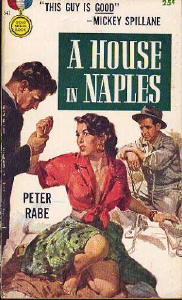
Forgotten Books: A House In Naples by Peter Rabe
Whenever I read Peter Rabe at his best--or hell, even when he's mediocore--I realize how bogus a lot of hardboiled fiction is. Raymond Chandler likely learned about crime from the pulps and B-movies. As did many pulp writers.
Today we tart things up in a way previous hardboiled writers didn't and that gives it a semblance of reality anyway. Or we parody it and that makes us feel superior to it. Nothing wrong with these approaches, either. They're entertaining, amusing, fun.
Maybe it was because Rabe approached his writing as mainstream instead of genre. While he honors the tropes set down by W.R. Burnett and his imitators Rabe's crime novels are idiosyncratic, sometimes to a fault. In a few books he wanders, gets lost, and it's always because he wants to tell us something fascinating but not germane to the story. I actually enjoy his side trips but they do damage a couple of his books.
A House in Naples is about two people who are pretty much despicable, deserters at the end of the big war who run a black market operation. They aren't much better morally than Graham Greene's Harry Lime. Charley and Joe they are, friends in greed. They are living in Naples and living well. But Charley doesn't have his papers and could get extradited. Uncle Sam is not looking favorably on deserters these days.
As the book opens Charley is wounded and recognized for who and what he is. He ends stealing the papers from a dying drunk and then ends up dragging the body into the Tiber to cover his tracks. But by this time his wound has taken his toll. He is barely concious when he looks up and sees a beautiful girl staring down at him from the bridge above. He falls in love. Rabe gives this unlikely moment an ethereal power that few others could have pulled off. You buy it.
The book is a fast, sure read and the ending is a shocker. But the characters and Rabe's observations on post-war Europe are the source of the book's rich bleakness. The bleakness is very much like the realist filmmakers who appeared in Italy right after the war.
Rabe uses The Girl to contrast Charley and Joe. In some respects she's almost a religious figure, a woman who can evoke good or evil in everyone she meets. She evokes what's in you already.
For some reason A House in Naples isn't mentioned as often as Rabe's other most successful novels. But its harsh poetry and exciting action will keep it in memory long after you're done with it.
Published on January 25, 2012 09:30
January 24, 2012
Blues In The Night by Dick Lochte
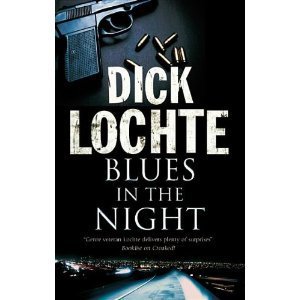
If I wrote a column called Thriller of The Month my choice for January would definitely be Dick Lochte's slick, sleek, knockout novel Blues In The Night.
An ex-con named David "Mace" Mason decides to help out mobster Paulie LaCotta. This means going back to LA for Mace and putting up with Paulie's quirky ways as well. But in this case Paulie isn't just quirky, he's deceitful and Mace soon learns that he's involved in a violent confrontation with mysterious forces without knowing why.
Since this is a Dick Lochte novel the story is told in a sardonic voice that enriches the cast of very real people, people being one of Lochte's specialties. Another speciality is Lochte's ability to turn wheels within wheels until you have no idea who's really do what. What makes this especially intriguing and memorable is the tour of modern-day LA Lochte gives us in his pursuit of the truth. '
I was going to start listing some of my favorite scenes but I stopped counting after fifteen. Perfectly realized, perfect paced sequences that set up even more twists and turns. Such as the eerie and startling one where Mace does or doesn't see a mutant dog. Straight out of a horror novel.
Dick Lochte has long been one of my favorite writers and this time out he's delivered a five star thrillerthat will stay with you for a long time after you close the covers.
Oh--and Mace is winning protagonist--tough but smart, knowing but not cynical. He could do with another book.
Published on January 24, 2012 14:03
January 23, 2012
Man With A Camera
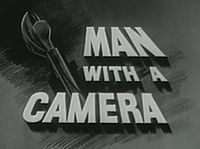
Ed here: I watched an episode of this last night because I had fond memories of it. Always a dicey undertaking. But it held up pretty well. Bronson broke the mold as far as TV detectives went. He wasn't all shiny and neat.
From Wikipedia: Man with a Camera is a 1950s television crime drama starring Charles Bronson.
Throughout the 1950s, Charles Bronson spent most of his early acting career in TV-shows as well as small parts in films, until he landed the lead in the ABC series The Man with a Camera.
In the series Bronson portrayed Mike Kovac, a former World War II combat photographer freelancing in New York City, who specialized in getting the photographs that other lensmen could not. He usually assisted newspapers, insurance companies, the police and private individuals, all of whom wanted a filmed record of an event.
By often acting as a private eye, Kovac gets himself into plenty of troubles involving criminals of every kind, helping with cases the police could not handle.
Besides an array of cameras for normal use, for surreptitious work Kovac employed cameras hidden in a radio, cigarette lighter and even his necktie. He also had a phone in his car, and a portable darkroom in the trunk where he could develop his negatives on the spot.
Kovac's police liaison was Lieutenant Donovan (James Flavin), though he frequently came for advice from Anton Kovac (Ludwig Stössel), his immigrant father.
Published on January 23, 2012 14:59
January 22, 2012
Oh my God no!! It's Sharktopus!!!!!!
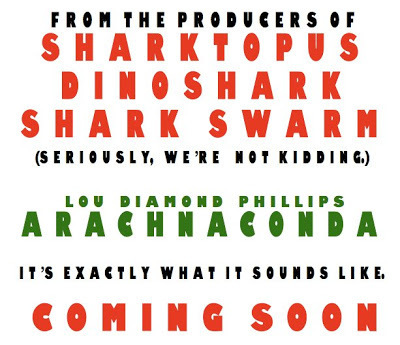
From TCM Movie Morlocks
Monsters Among Us!
Posted by Richard Harland Smith on January 20, 2012
This week, two screenwriter friends of mine were retained to write monster movies for a new production company called The Monster Machine. David Rosiak and Matthew Chernov have already written the made-for-TV chompalooza SHARK SWARM (2008) and are pushing forward to craft more supersized and hybridized horrors for the producers of DINOSHARK (2010) and SHARKTOPUS (2010). I'm happy for my friends and the news evoked in me the kneejerk response "Good… I miss monsters." And then the strangeness of that reaction struck me — there are monsters everywhere these days, so what's the big deal? Watch any SyFy and it's back-to-back ads for video games and made-for-TV movies and theatrical releases offering all manner of freakish folderol and dedicated reality TV shows for Bigfoot, river monsters and ghosts foreign and domestic. We're actually living in what could be called, quantitatively, a monster renaissance akin to the glory days of the 1940s and 1950s, when dinosaurs roamed the earth and sent real estate values crumbling like so many scale model metropoli… but it's not the same. It's just not the same.
Sixty years ago, monster movies were crumbs cast off from the major studios, chicken feed for the kids and the punters who liked to eat popcorn and have something big to look at while doing it. Titles like THE BEAST FROM 20,000 FATHOMS (1953), THEM! (1954) and IT CAME FROM BENEATH THE SEA (1955) and others were not staffed with movie stars but cast instead from the ranks of the contract players, workaday actors who owed some time or some years to their home studios, or who were on loan-out from another. Most of the people doing the movies had no love for the genre, for horror, for le fantastique — it was just rent and gas money, alimony, braces for the kids, a down payment. From the directors down to the writers, actors and technicians, monster movies were the cinematic equivalent of the $2 betting window at the race track… a place where a little money could be made and better things financed. Sure, some studios (Universal, for one) made bank off the tendering of horror and science fiction but the category was still considered down-market, common, dumb. Happily, crafty artisans used the medium to sneak in ideas and techniques that were brash, blasphemous and novel at the time and in retrospect a lot of monster movies of the Classic Age of Hollywood play better now than they did originally, now that we can appreciate their subthemes and hidden motifs
What's great about old monster movies is that there is always a reliable level of craftsmanship, of competence and reliability. If the script is dodgy, the playing is persuasive. If the acting is wooden, the script will offer thought-provoking ideas or smart dialogue. Even if the scenario boils down to little more than a guy in an ape suit and gabardine slacks or a mollusk puppet dripping Noxema from its molded rubber maw, the effects entertain, sometimes fascinate, and invariably charm while reality is worked in from the side through the matter-of-fact playing of the ensemble and the insistence on the part of everyone involved of absolute professionalism. And some of the time — and THE THING FROM ANOTHER WORLD (1951) comes immediately to mind — book, performance and production come together to give us something truly unforgettable… something our children and grandchildren will be talking about long after we're gone.
for the rest go here:http://moviemorlocks.com/2012/01/20/m...
Published on January 22, 2012 12:25
Ed Gorman's Blog
- Ed Gorman's profile
- 118 followers
Ed Gorman isn't a Goodreads Author
(yet),
but they
do have a blog,
so here are some recent posts imported from
their feed.



